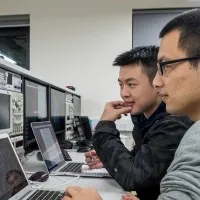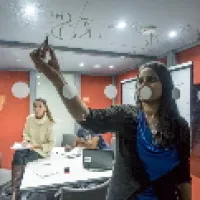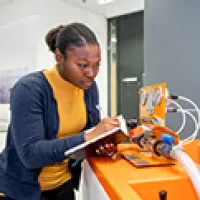About this course
This course is full and closed to new applications for 2024 entry. Search similar degrees in related courses or by browsing our course finder.
On this computer science master's course you’ll learn how to design, build and deliver software programs and systems. You’ll find out about the latest advances in areas such as machine learning, cyber security and computer vision, preparing you for success in a fast-moving industry. You’ll cover the main areas of computer science, then study advanced topics that suit your career plans.
We offer superb facilities and a wide choice of modules taught by expert researchers.
On this accredited 4-year degree course, you’ll study topics such as:
- algorithmics
- data management
- software design
- modelling
- interaction design
- cyber security
You’ll study in computer science labs that include teaching labs with the latest equipment and high-quality displays, as well as dedicated labs for project work. For modules with an electronics component, you’ll have access to our superb electronics teaching labs.
This MEng Computer Science degree is accredited by the British Computer Society.
We're also accredited by the Institution of Engineering and Technology on behalf of the Engineering Council for the purposes of fully meeting the academic requirement for registration as a Chartered Engineer.
Year in industry
Enhance your employability by taking this course with a paid industrial studies placement year.
Apply using:
- Course name: Computer Science with Industrial Studies
- UCAS code: 10II
You'll spend this extra year at one of our partner companies, applying the skills and knowledge you've learned so far.
The fee is 20% of the standard annual tuition fee.
We regularly review our courses to ensure and improve quality. This course may be revised as a result of this. Any revision will be balanced against the requirement that the student should receive the educational service expected. Find out why, when, and how we might make changes.
Our courses are regulated in England by the Office for Students (OfS).
Learn more about this subject area
Course location
This course is based at Highfield.
Awarding body
This qualification is awarded by the University of Southampton.
Download the Course Description Document
The Course Description Document details your course overview, your course structure and how your course is taught and assessed.
Entry requirements
For Academic year 202425
A-levels
A*AA including mathematics (minimum grade A).
A-levels additional information
A pass in the science Practical is required where it is separately endorsed.
Offers typically exclude General Studies and Critical Thinking.
Applicants who have not studied mathematics at A-level can apply for the Engineering/Physics/Mathematics Foundation Year
A-levels with Extended Project Qualification
If you are taking an EPQ in addition to 3 A levels, you will receive the following offer in addition to the standard A level offer: AAA including mathematics (minimum grade A), plus grade A in the EPQ
A-levels contextual offer
We are committed to ensuring that all applicants with the potential to succeed, regardless of their background, are encouraged to apply to study with us. The additional information gained through contextual data allows us to recognise an applicant's potential to succeed in the context of their background and experience. Applicants who are highlighted in this way will be made an offer which is lower than the typical offer for that programme, as follows: AAA including mathematics (minimum grade A)
International Baccalaureate Diploma
Pass, with 38 points overall, with 19 points required at Higher Level including 6 at Higher Level in Mathematics (Analysis and Approaches) or 7 at Higher Level in Mathematics (Applications and Interpretation)
International Baccalaureate Diploma additional information
Applicants who have not studied the required subjects at Higher Level can apply for the Engineering/Physics/Mathematics Foundation Year
International Baccalaureate contextual offer
We are committed to ensuring that all learners with the potential to succeed, regardless of their background, are encouraged to apply to study with us. The additional information gained through contextual data allows us to recognise a learner’s potential to succeed in the context of their background and experience. Applicants who are highlighted in this way will be made an offer which is lower than the typical offer for that programme.
International Baccalaureate Career Programme (IBCP) statement
Offers will be made on the individual Diploma Course subject(s) and the career-related study qualification. The CP core will not form part of the offer. Where there is a subject pre-requisite(s), applicants will be required to study the subject(s) at Higher Level in the Diploma course subject and/or take a specified unit in the career-related study qualification. Applicants may also be asked to achieve a specific grade in those elements. Please see the University of Southampton International Baccalaureate Career-Related Programme (IBCP) Statement for further information. Applicants are advised to contact their Faculty Admissions Office for more information.
BTEC
D in the BTEC National Extended Certificate plus grades A*A from two A-levels including mathematics (minimum grade A) or D* in the BTEC National Extended Certificate plus grades AA from two A-levels including mathematics.
D*D in the BTEC National Diploma plus grade A in A-level mathematics or DD in the BTEC National Diploma plus grade A* in A-level mathematics.
We will consider the BTEC National Extended Diploma if studied alongside A-level mathematics.
RQF BTEC
We are committed to ensuring that all learners with the potential to succeed, regardless of their background, are encouraged to apply to study with us. The additional information gained through contextual data allows us to recognise a learner’s potential to succeed in the context of their background and experience. Applicants who are highlighted in this way will be made an offer which is lower than the typical offer for that programme.
Additional information
Offers typically exclude General Studies and Critical Thinking. A pass in the science Practical is required where it is separately endorsed. Applicants who have not studied mathematics at A-level can apply for the Engineering/Physics/Mathematics Foundation Year
QCF BTEC
D in the BTEC Subsidiary Diploma plus grades A*A from two A-levels including mathematics (minimum grade A) or D* in the BTEC Subsidiary Diploma plus grades AA from 2 A-levels including mathematics.
D*D in the BTEC Diploma plus grade A in A-level mathematics or DD in the BTEC Diploma plus grade A* in A-level mathematics.
We will consider the BTEC Extended Diploma if studied alongside A-level mathematics.
We are committed to ensuring that all learners with the potential to succeed, regardless of their background, are encouraged to apply to study with us. The additional information gained through contextual data allows us to recognise a learner’s potential to succeed in the context of their background and experience. Applicants who are highlighted in this way will be made an offer which is lower than the typical offer for that programme.
Access to HE Diploma
Not accepted for this course. Applicants with an Access to HE Diploma in a relevant subject should apply for the Engineering/Physics/Mathematics Foundation Year
Irish Leaving Certificate
Irish Leaving Certificate (first awarded 2017)
H1 H1 H1 H2 H2 H2, to include mathematics and applied mathematics
Irish Leaving Certificate (first awarded 2016)
A1 A1 A1 A2 A2 A2 including mathematics and applied mathematics
Irish certificate additional information
Applicants who have not studied the required subjects can apply for the Engineering/Physics/Mathematics Foundation Year
Scottish Qualification
Offers will be based on exams being taken at the end of S6. Subjects taken and qualifications achieved in S5 will be reviewed. Careful consideration will be given to an individual’s academic achievement, taking in to account the context and circumstances of their pre-university education.
Please see the University of Southampton’s Curriculum for Excellence Scotland Statement (PDF) for further information. Applicants are advised to contact their Faculty Admissions Office for more information.
Cambridge Pre-U
D2, D3, D3 in three Principal subjects including mathematics
Cambridge Pre-U additional information
Cambridge Pre-U's can be used in combination with other qualifications such as A levels to achieve the equivalent of the typical offer, where D2 can be used in lieu of A-level grade A* or grade D3 can be used in lieu of A-level grade A. Applicants who have not studied the required Principal subjects can apply for the Engineering/Physics/Mathematics Foundation Year
Welsh Baccalaureate
A*AA including mathematics (minimum grade A) or A*A from two A-levels including mathematics (minimum grade A), and A from the Advanced Welsh Baccalaureate Skills Challenge Certificate.
Welsh Baccalaureate additional information
A pass in the science Practical is required where it is separately endorsed. Offers typically exclude General Studies and Critical Thinking. Applicants who have not studied the required subjects can apply for the Engineering/Physics/Mathematics Foundation Year
Welsh Baccalaureate contextual offer
We are committed to ensuring that all applicants with the potential to succeed, regardless of their background, are encouraged to apply to study with us. The additional information gained through contextual data allows us to recognise an applicant's potential to succeed in the context of their background and experience. Applicants who are highlighted in this way will be made an offer which is lower than the typical offer for that programme.
T-Level
A Distinction* overall, with A* in Core and Distinction in the Occupational Specialism, and grade A in A-level Mathematics.
The following T levels are accepted:
- Digital Business Services
- Digital Support Services
- Science
- Design and Development for Engineering and Manufacturing
- Maintenance, Installation and Repair for Engineering and Manufacturing
The following Occupational Specialisms are required:
- For the T level in Design and Development for Engineering and Manufacturing: either "Electrical and electronic engineering” or "Control and instrumentation engineering".
- For the T level in Maintenance, Installation and Repair for Engineering and Manufacturing: either "Maintenance engineering technologies: Electrical and Electronic" or "Maintenance engineering technologies: Mechatronic" or "Maintenance engineering technologies: Control and Instrumentation" or "Light and Electric Vehicles".
Other requirements
GCSE requirements
Applicants must hold GCSE English language (or GCSE English) (minimum grade 4/C) and mathematics (minimum grade 4/C)
Find the equivalent international qualifications for our entry requirements.
English language requirements
If English isn't your first language, you'll need to complete an International English Language Testing System (IELTS) to demonstrate your competence in English. You'll need all of the following scores as a minimum:
IELTS score requirements
- overall score
- 6.5
- reading
- 6.0
- writing
- 6.0
- speaking
- 6.0
- listening
- 6.0
We accept other English language tests. Find out which English language tests we accept.
You might meet our criteria in other ways if you do not have the qualifications we need. Find out more about:
- our Access to Southampton scheme for students living permanently in the UK (including residential summer school, application support and scholarship)
- skills you might have gained through work or other life experiences (otherwise known as recognition of prior learning)
Find out more about our Admissions Policy.
Foundation year for engineering, physics, maths and geophysics
A foundation year will give you the skills and knowledge to progress to this course if you don't have the right qualifications for direct entry.
It could be the right option if you:
- have A levels, or equivalent international qualifications, in subjects other than the ones needed for direct entry
- have international qualifications in relevant subjects but not at A level equivalent
- have a BTEC Extended Diploma in a relevant subject
- are studying an Access course in a relevant subject
- are a mature student with relevant experience or study
You'll also need to show that you have strong maths skills.
Find full details on our Engineering, Maths, Physics, Geophysics Foundation Year page.
For Academic year 202526
A-levels
A*AA including mathematics (minimum grade A).
A-levels additional information
A pass in the science Practical is required where it is separately endorsed.
Offers typically exclude General Studies and Critical Thinking.
Applicants who have not studied mathematics at A-level can apply for the Engineering/Physics/Mathematics Foundation Year
A-levels with Extended Project Qualification
If you are taking an EPQ in addition to 3 A levels, you will receive the following offer in addition to the standard A level offer: AAA including mathematics (minimum grade A), plus grade A in the EPQ
A-levels contextual offer
We are committed to ensuring that all learners with the potential to succeed, regardless of their background, are encouraged to apply to study with us. The additional information gained through contextual data allows us to recognise a learner’s potential to succeed in the context of their background and experience. Applicants who are highlighted in this way will be made an offer which is lower than the typical offer for that programme.
International Baccalaureate Diploma
Pass, with 38 points overall, with 19 points required at Higher Level including 6 at Higher Level in Mathematics (Analysis and Approaches) or 7 at Higher Level in Mathematics (Applications and Interpretation)
International Baccalaureate Diploma additional information
Applicants who have not studied the required subjects at Higher Level can apply for the Engineering/Physics/Mathematics Foundation Year
International Baccalaureate contextual offer
We are committed to ensuring that all learners with the potential to succeed, regardless of their background, are encouraged to apply to study with us. The additional information gained through contextual data allows us to recognise a learner’s potential to succeed in the context of their background and experience. Applicants who are highlighted in this way will be made an offer which is lower than the typical offer for that programme.
International Baccalaureate Career Programme (IBCP) statement
Offers will be made on the individual Diploma Course subject(s) and the career-related study qualification. The CP core will not form part of the offer. Where there is a subject pre-requisite(s), applicants will be required to study the subject(s) at Higher Level in the Diploma course subject and/or take a specified unit in the career-related study qualification. Applicants may also be asked to achieve a specific grade in those elements. Please see the University of Southampton International Baccalaureate Career-Related Programme (IBCP) Statement for further information. Applicants are advised to contact their Faculty Admissions Office for more information.
BTEC
D in the BTEC National Extended Certificate plus grades A*A from two A-levels including mathematics (minimum grade A) or D* in the BTEC National Extended Certificate plus grades AA from two A-levels including mathematics.
D*D in the BTEC National Diploma plus grade A in A-level mathematics or DD in the BTEC National Diploma plus grade A* in A-level mathematics.
We will consider the BTEC National Extended Diploma if studied alongside A-level mathematics.
RQF BTEC
We are committed to ensuring that all learners with the potential to succeed, regardless of their background, are encouraged to apply to study with us. The additional information gained through contextual data allows us to recognise a learner’s potential to succeed in the context of their background and experience. Applicants who are highlighted in this way will be made an offer which is lower than the typical offer for that programme.
Additional information
Offers typically exclude General Studies and Critical Thinking. A pass in the science Practical is required where it is separately endorsed. Applicants who have not studied mathematics at A-level can apply for the Engineering/Physics/Mathematics Foundation Year
QCF BTEC
D in the BTEC Subsidiary Diploma plus grades A*A from two A-levels including mathematics (minimum grade A) or D* in the BTEC Subsidiary Diploma plus grades AA from 2 A-levels including mathematics.
D*D in the BTEC Diploma plus grade A in A-level mathematics or DD in the BTEC Diploma plus grade A* in A-level mathematics.
We will consider the BTEC Extended Diploma if studied alongside A-level mathematics.
We are committed to ensuring that all learners with the potential to succeed, regardless of their background, are encouraged to apply to study with us. The additional information gained through contextual data allows us to recognise a learner’s potential to succeed in the context of their background and experience. Applicants who are highlighted in this way will be made an offer which is lower than the typical offer for that programme.
Access to HE Diploma
Not accepted for this course. Applicants with an Access to HE Diploma in a relevant subject should apply for the Engineering/Physics/Mathematics Foundation Year
Irish Leaving Certificate
Irish Leaving Certificate (first awarded 2017)
H1 H1 H1 H2 H2 H2, to include mathematics and applied mathematics
Irish Leaving Certificate (first awarded 2016)
A1 A1 A1 A2 A2 A2 including mathematics and applied mathematics
Irish certificate additional information
Applicants who have not studied the required subjects can apply for the Engineering/Physics/Mathematics Foundation Year
Scottish Qualification
Offers will be based on exams being taken at the end of S6. Subjects taken and qualifications achieved in S5 will be reviewed. Careful consideration will be given to an individual’s academic achievement, taking in to account the context and circumstances of their pre-university education.
Please see the University of Southampton’s Curriculum for Excellence Scotland Statement (PDF) for further information. Applicants are advised to contact their Faculty Admissions Office for more information.
Cambridge Pre-U
D2, D3, D3 in three Principal subjects including mathematics
Cambridge Pre-U additional information
Cambridge Pre-U's can be used in combination with other qualifications such as A levels to achieve the equivalent of the typical offer, where D2 can be used in lieu of A-level grade A* or grade D3 can be used in lieu of A-level grade A. Applicants who have not studied the required Principal subjects can apply for the Engineering/Physics/Mathematics Foundation Year
Welsh Baccalaureate
A*AA including mathematics (minimum grade A) or A*A from two A-levels including mathematics (minimum grade A), and A from the Advanced Welsh Baccalaureate Skills Challenge Certificate.
Welsh Baccalaureate additional information
A pass in the science Practical is required where it is separately endorsed. Offers typically exclude General Studies and Critical Thinking. Applicants who have not studied the required subjects can apply for the Engineering/Physics/Mathematics Foundation Year
Welsh Baccalaureate contextual offer
We are committed to ensuring that all applicants with the potential to succeed, regardless of their background, are encouraged to apply to study with us. The additional information gained through contextual data allows us to recognise an applicant's potential to succeed in the context of their background and experience. Applicants who are highlighted in this way will be made an offer which is lower than the typical offer for that programme.
T-Level
A Distinction* overall, with A* in Core and Distinction in the Occupational Specialism, and grade A in A-level Mathematics.
The following T levels are accepted:
- Digital Business Services
- Digital Support Services
- Science
- Design and Development for Engineering and Manufacturing
- Maintenance, Installation and Repair for Engineering and Manufacturing
The following Occupational Specialisms are required:
- For the T level in Design and Development for Engineering and Manufacturing: either "Electrical and electronic engineering” or "Control and instrumentation engineering".
- For the T level in Maintenance, Installation and Repair for Engineering and Manufacturing: either "Maintenance engineering technologies: Electrical and Electronic" or "Maintenance engineering technologies: Mechatronic" or "Maintenance engineering technologies: Control and Instrumentation" or "Light and Electric Vehicles".
Other requirements
GCSE requirements
Applicants must hold GCSE English language (or GCSE English) (minimum grade 4/C) and mathematics (minimum grade 4/C)
Find the equivalent international qualifications for our entry requirements.
English language requirements
If English isn't your first language, you'll need to complete an International English Language Testing System (IELTS) to demonstrate your competence in English. You'll need all of the following scores as a minimum:
IELTS score requirements
- overall score
- 6.5
- reading
- 6.0
- writing
- 6.0
- speaking
- 6.0
- listening
- 6.0
We accept other English language tests. Find out which English language tests we accept.
You might meet our criteria in other ways if you do not have the qualifications we need. Find out more about:
- our Access to Southampton scheme for students living permanently in the UK (including residential summer school, application support and scholarship)
- skills you might have gained through work or other life experiences (otherwise known as recognition of prior learning)
Find out more about our Admissions Policy.
Foundation year for engineering, physics, maths and geophysics
A foundation year will give you the skills and knowledge to progress to this course if you don't have the right qualifications for direct entry.
It could be the right option if you:
- have A levels, or equivalent international qualifications, in subjects other than the ones needed for direct entry
- have international qualifications in relevant subjects but not at A level equivalent
- have a BTEC Extended Diploma in a relevant subject
- are studying an Access course in a relevant subject
- are a mature student with relevant experience or study
You'll also need to show that you have strong maths skills.
Find full details on our Engineering, Maths, Physics, Geophysics Foundation Year page.
Got a question?
Please contact our enquiries team if you're not sure that you have the right experience or qualifications to get onto this course.
Email: enquiries@southampton.ac.uk
Tel: +44(0)23 8059 5000
Course structure
This accredited course is designed to give you industry experience alongside our research-led teaching. We encourage you to take summer work placements in an industry of your choice or even add a full year in industry to help you gain the experience you need for accreditation.
All our computer science degree courses share the same compulsory modules in years 1 and 2, making it easy to switch between them. In the third year, you can tailor your degree by choosing optional modules.
Year 1 overview
You’ll study the logical and mathematical theory underpinning computer science. You’ll also gain an understanding of the fundamentals of computer hardware.
As an introduction to software engineering, you’ll cover data structures and algorithms. You’ll also look at the principles of programming, including using an object-oriented approach and software engineering processes.
You’ll apply your knowledge by working on practical projects. For example, you’ll build algorithms and data analysis tools, and develop software user interfaces.
Year 2 overview
You’ll deepen your understanding of computer science by studying topics, such as artificial intelligence, communication protocols and the TCP/IP layered model.
A group project will give you first-hand experience of working in a team, and of communication and scale in software engineering.
Year 3 overview
An individual project is a chance to conduct in-depth research in an area of computer science that interests you, under the supervision of an academic with expertise in your chosen field. This could involve designing, building and testing software or a computer system. Themes covered by past projects include:
- smart home cyber security
- fake news recognition
- the medical applications of gesture sensing technology
You’ll take a compulsory module in engineering management and law. Optional modules, cover topics such as machine learning, multimedia, web infrastructure and the cloud.
You could also study a language, take modules from other disciplines such as psychology or chemistry, or choose from a range of innovative interdisciplinary modules.
Year 4 overview
You’ll take part in a group design project, working in a team that may include students from other engineering disciplines. You’ll work with a real industry or academic customer. Past projects have included:
- an automated colouriser for digital images, for a company that specialises in large-scale 3D scanning
- smart clothing to help patients with physical rehabilitation, for the university’s health sciences researchers
Optional modules, cover a wise range of specialist topics such as, cryptography, agent-based computing, e-business and image processing.
There is also the chance to study abroad for a semester.
Want more detail? See all the modules in the course.
Modules
The modules outlined provide examples of what you can expect to learn on this degree course based on recent academic teaching. As a research-led University, we undertake a continuous review of our course to ensure quality enhancement and to manage our resources. The precise modules available to you in future years may vary depending on staff availability and research interests, new topics of study, timetabling and student demand. Find out why, when and how we might make changes.
Year 1 modules
You must study the following modules in year 1:
Algorithmics
COMP Part I Laboratory Programme
This module is the lab programme for all first-year students enrolled on the Computer Science or Software Engineering degree programmes. Structurally, the Part I Laboratory Programme organises all practical, professional and laboratory-based work in Part ...
Computer Systems I
Data Management
Mathematics I
Mathematics II
Networks and Security
Programming I
Programming II
Year 2 modules
You must study the following modules in year 2:
Artificial Intelligence
Computer Systems II
Formal Specification and Verification
Programming III
Programming Language Concepts
Software Design and Development Project
Theory of Computing
Year 3 modules
You must study the following modules in year 3:
Part III Individual Project Phase 1
The Part Three Individual Project gives students the opportunity to gain both detailed knowledge and practical experience in a more focussed area than generally possible elsewhere in their degree programme. Most projects are in the nature of a challenging...
Part III Individual Project Phase 2
The Part III Individual Project gives students the opportunity to gain both detailed knowledge and practical experience in a more focussed area than generally possible elsewhere in their degree programme. Most projects are in the nature of a challenging e...
You must also choose from the following modules in year 3:
Advanced Computer Architecture
This module covers the development of modern computer architectures for servers, workstations, hand-held devices, signal processing and embedded systems from the introduction of the four-stage RISC pipeline to the present day.
Advanced Computer Networks
This module is designed to be a follow-up module to the computer Science or ITO second year introductory networking module. The wireless networking part reviews wireless technologies and their application in areas such as IoT and sensor networks. The mod...
Advanced Databases
This module builds on the first year Data Management module to give students a deeper and broader view of the issues involved in database management systems, some of the most complex software in common use.
Causal Reasoning and Machine Learning
Cheminformatics
This course is an introduction to the use of computers in chemistry, commonly referred to as cheminformatics. A number of aspects will be covered, with the aim of giving a firm basis to continue with research in cheminformatics in industry or academia. Th...
Cloud Application Development
During the first two years of the degree students gain experience in a variety of 'traditional' programming languages in procedural, functional and object-oriented flavours. This module addresses the design and use of scripting languages for a contemporar...
Computational Biology
Modern biology poses many challenging problems for the computer scientists. Rapid growth in instrumentation, and our ability to archive and distribute vast amounts of data, has significantly changed the way we attempt to understand cellular function, and ...
Computer Vision
The challenge of computer vision is to develop a computer based system with the capabilities of the human eye-brain system. It is therefore primarily concerned with the problem of capturing and making sense of digital images. The field draws heavily on ma...
Foundations of Machine Learning
Machine Learning is about extracting useful information from large and complex datasets. The subject is a rich mixture of concepts from function analysis, statistical modelling and computational techniques. The module will cover the fundamental principles...
Game Design and Development
Games design and development is an increasingly important and sophisticated topic, that draws together many of the core aspects of Computer Science and Software Engineering. This course introduces students to the fundamentals of game design, gives them pr...
History of Computing
Our modern world has been profoundly shaped by the availability of cheap and reliable computers, but the ubiquity of this technology has led many to overlook the rich history of its development. In this module, we will study the evolution of technologi...
Machine Learning Technologies
Machine Learning is about extracting useful information from large and complex datasets. The module will cover the practical basis of how learning algorithms are can be applied. You will gain hands-on experience in laboratory-bases sessions. Exclusions...
Natural Language Processing
This module gives students an introduction to natural language processing (NLP) algorithms and an understanding of how to implement NLP applications.
Operational Research
The module introduces the operational research approach for modelling and solving engineering and management problems.
Optimisation
The module provides an introduction to the theory and practice of optimization techniques. It covers linear programming as well as nonlinear programming. This module is suitable to those who want to apply computational optimization methods to their proble...
Real-Time Computing and Embedded Systems
This module gives a broad introduction to development of real-time and embedded systems
Robotic Systems
Robots are becoming more widely used in society, with applications ranging from agriculture through to manufacturing, with increasing interest in autonomous systems. This module will introduce students to the fundamentals of robotic systems including k...
Security of Cyber Physical Systems
The course requires to understand C code, assembly language, x86 architectures and memory allocation (a refresher will be provided).
Social Computing Techniques
Web Architecture and Hypertext Technologies
Web and Cloud Based Security
This module will teach the principles of security in web and cloud based systems and how these principles apply in a range of different applications.
Year 4 modules
You must study the following modules in year 4:
Group Design Project
This module provides an introduction to intensive group project work in collaboration with an industrial or academic customer. Students work in groups of at least four people on a project typically based on an idea from an industrial partner, or from an a...
Industrial Studies
This Industrial Studies module is part of our MEng programmes with “Industrial Studies” in the title, and allows students to go on to a one-year placement in industry in Part III of their programme. Students are normally expected start their placement...
Software Security
This module focuses on both theoretical and practical perspectives in the security of software and software systems, by exploring software analysis and reverse engineering. The aims of the module at a high level are to: - Explore common threats to ...
You must also choose from the following modules in year 4:
Advanced Games Design and Development
This module extends the topics covered in the Game Design and Development module by looking at games design that uses more complex technology, or is situated in novel contexts. Students will get further practical experience of developing games within an i...
Advanced Machine Learning
- To introduce key concepts in pattern recognition and machine learning; including specific algorithms for classification, regression, clustering and probabilistic modeling. - To give a broad view of the general issues arising in the application of algor...
Advanced Programming Language Concepts
This module covers concepts in programming languages that go beyond those typically seen or are new to mainstream languages. The goal is to encourage students to look beyond traditional programming practice by introducing new tools and techniques inspired...
Algorithmic Game Theory
This module: - Introduces the students to the key issues of interaction of multiple self-interested parties (a.k.a. agents) and gives a broad survey of topics at the interface of theoretical computer science and game theory dealing with such interactions...
Automated Software Verification
This module aims to train students in both the principles and the practice of software verification. A range of verification approaches, including both testing and formal verification, will be covered. The use of logic as a specification language for prog...
Bayesian, Active & Reinforcement Learning
Biologically Inspired Robotics
This module lies at the intersection of robotics and biology. Through the abstraction of design principles from biological systems, it is possible to develop a range of core competences, including mechatronic systems, sensor and actuator technologies. By ...
Biometrics
Biometrics is about how we can recognise people automatically, by personal characteristic. We all have fingerprints and faces - and they are unique. We have to sense the information, process it and then deliver an assessment of the identity associated wit...
Computational Finance
Financial markets form the source of a vast number of challenging computational problems. These are not only intellectually challenging from the point of view of computational modelling, but the financial sector is also an employer of a significant fracti...
Cryptography
This module covers the mathematics, techniques, and applications of modern cryptography. We will look at the history of code making and code breaking, and draw lessons for the future from the mistakes and successes of the past. We will also give a gentle ...
Data Mining
The challenge of data mining is to transform raw data into useful information and actionable knowledge. Data mining is the computational process of discovering patterns in data sets involving methods at the intersection of artificial intelligence, machine...
Data Visualisation
Welcome to the Data Visualisation module! In this course, you would learn about the terminology, concepts and techniques behind visualising data, and will get to use a range of tools to get experience of creating visual representations of data. You will g...
Deep Learning Technologies
Deep learning has revolutionised numerous fields in recent years. We've witnessed improvements in everything from computer vision through speech analysis to natural language processing as a result of the advent of massively parallel compute coupled with l...
Differentiable Programming and Deep Learning
Deep learning and differentiable programming has revolutionised numerous fields in recent years. We've witnessed improvements in everything from computer vision through speech analysis to natural language processing as a result of the advent of cheap GPGP...
Digital Forensics
We will study the tools and techniques used in digital forensics and its relevance to incident responses and criminal investigations. This will include: Network Traffic, Disk and Memory Forensics, Hardware Architectures, Forensics frameworks, Attributions...
Evolution of Complexity
Evolution by natural selection has created amazingly complex and sophisticated solutions to some very difficult problems - how exactly does it achieve this, and how can we harness this capability for engineering artificial systems and computational proble...
Image Processing
This module is useful to introduce: - Image processing and its relation to signal processing. - Image transformations for filtering, coding and etc. - Histogram processing algorithms to enhance image qualities and visibility. - Theories analysing and ...
Individual Research Project
The Individual Research Project is a 7.5 ECTS credit masters level module undertaken by independent study that allows students to demonstrate mastery of an advanced aspect of their discipline, including critical evaluation of current research and research...
Intelligent Agents
This module gives a broad introduction to the new and rapidly expanding field of agent-based computing. It introduces the key concepts and models of the field, dealing both with the individual agents and with their interactions. Particular emphasis is pla...
Knowledge Graphs for AI Systems
The last decade and a half have seen the Web move away from a purely document-centric information system to one in which hypertext techniques are applied to the sort of data found in databases; the term “Semantic Web” is used to refer to this Web of linke...
Optimisation for Machine Learning
This module is about the fundamentals of algorithms solving continuous optimisation problems, which involve minimising functions of multiple real-valued variables, possibly subject to restrictions, constraints, and nondifferentiable regularisations on the...
Probability in Computing
Computer Science has evolved significantly over the past decades, and various subfields require a strong foundation in probability. Such fondation is important in studying randomized algorithms, algorithm analysis, approximation algorithms and artificial ...
Simulation Modelling for Computer Science
Simulation modelling plays an increasingly significant role across modern science and engineering, with the development of computational models becoming established practice in industry, consulting, and policy formulation. Computer scientists are often em...
Social Media and Network Science
The second generation of web sites that came along in the mid 2000's included many of the social media sites that are now household names (YouTube, Flickr, Wikipedia, Facebook, Blogger, Twitter, etc.) These sites (known at the time as Web 2.0) focused on ...
Software Project Management and Secure Development
This module prepares students to develop an understanding of the critical issues and application of software project management. It introduces the students to the tools, techniques and body of knowledge involved in each stage of the project management lif...
Software Security
This module focuses on both theoretical and practical perspectives in the security of software and software systems, by exploring software analysis and reverse engineering. The aims of the module at a high level are to: - Explore common threats to ...
Wireless Networks
This course is intended to give students an outline of how wireless communication and computer networks work "above the physical layer". This includes the interoperability of wireless networks such as WiMax/GPRS and WiFi to provide WiFi on trains etc. How...
Learning and assessment
The learning activities for this course include the following:
- lectures
- classes and tutorials
- coursework
- individual and group projects
- independent learning (studying on your own)
Course time
How you'll spend your course time:
Year 1
Study time
Your scheduled learning, teaching and independent study for year 1:
How we'll assess you
- coursework, laboratory reports and essays
- design and problem-solving exercises
- individual and group projects
- oral presentations
- written exams
Your assessment breakdown
Year 1:
Year 2
Study time
Your scheduled learning, teaching and independent study for year 2:
How we'll assess you
- coursework, laboratory reports and essays
- design and problem-solving exercises
- individual and group projects
- oral presentations
- written exams
Your assessment breakdown
Year 2:
Academic support
You’ll be supported by a personal academic tutor and have access to a senior tutor.
Course leader
Nicholas Gibbins is the course leader.
Careers
A computer science master's is highly respected in industry, and you’ll have great job prospects in an expanding global marketplace. In the UK alone, the digital sector is creating jobs twice as fast as other parts of the economy.
Most of our graduates go straight into computer science jobs in high-tech companies; potential roles include software engineer, app developer, web developer or systems analyst.
Companies actively seek to recruit our graduates, knowing that they will start contributing as soon as they enter the workplace.
Whether you want to work in programming and software development, or you’re keen to work with organisations to manage IT projects or oversee their information systems, this versatile degree will help you to achieve your aims. It is also a great foundation for further study at master's degree or PhD level.
You can get placements and employment with local, national and international employers with our help.
Our Computer Science graduates have secured roles at organisations including:
- Apple
- Sony
- Cisco Systems
- Audi
- Microsoft
This degree is accredited by the British Computer Society and the Institution of Engineering and Technology.
Careers services at Southampton
We are a top 20 UK university for employability (QS Graduate Employability Rankings 2022). Our Careers, Employability and Student Enterprise team will support you. This support includes:
- work experience schemes
- CV and interview skills and workshops
- networking events
- careers fairs attended by top employers
- a wealth of volunteering opportunities
- study abroad and summer school opportunities
We have a vibrant entrepreneurship culture and our dedicated start-up supporter, Futureworlds, is open to every student.
Work in industry
This degree is available with a year in industry.
Fees, costs and funding
Tuition fees
Fees for a year's study:
- UK students pay £9,250.
- EU and international students pay £27,400.
Your fees will remain the same each year from when you start studying this course. This includes if you suspend and return.
What your fees pay for
Your tuition fees pay for the full cost of tuition and standard exams.
Find out how to:
Accommodation and living costs, such as travel and food, are not included in your tuition fees. There may also be extra costs for retake and professional exams.
Explore:
Bursaries, scholarships and other funding
If you're a UK or EU student and your household income is under £25,000 a year, you may be able to get a University of Southampton bursary to help with your living costs. Find out about bursaries and other funding we offer at Southampton.
If you're a care leaver or estranged from your parents, you may be able to get a specific bursary.
Get in touch for advice about student money matters.
Scholarships and grants
You may be able to get a scholarship or grant to help fund your studies.
We award scholarships and grants for travel, academic excellence, or to students from under-represented backgrounds.
Support during your course
The Student Services Centre offers support and advice on money to students. You may be able to access our Student Support fund and other sources of financial support during your course.
Funding for EU and international students
Find out about funding you could get as an international student.
How to apply
When you apply use:
- UCAS course code: G401
- UCAS institution code: S27
What happens after you apply?
We will assess your application on the strength of your:
- predicted grades
- academic achievements
- personal statement
- academic reference
We'll aim to process your application within 2 to 6 weeks, but this will depend on when it is submitted. Applications submitted in January, particularly near to the UCAS equal consideration deadline, might take substantially longer to be processed due to the high volume received at that time.
Equality and diversity
We treat and select everyone in line with our Equality and Diversity Statement.
Got a question?
Please contact our enquiries team if you're not sure that you have the right experience or qualifications to get onto this course.
Email: enquiries@southampton.ac.uk
Tel: +44(0)23 8059 5000
Related courses

Artificial Intelligence

Artificial Intelligence

Computer Engineering

Computer Engineering

Computer Science

Computer Science with Artificial Intelligence

Computer Science with Cyber Security

Creative Computing

Electronic Engineering with Computer Systems

Mathematics with Computer Science

Mechanical Engineering / Computational Engineering and Design

Software Engineering

